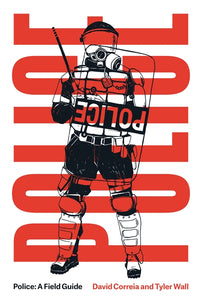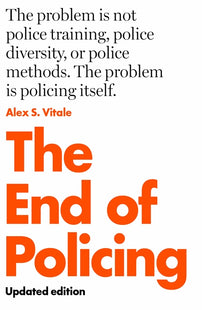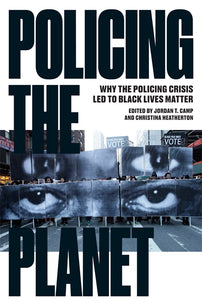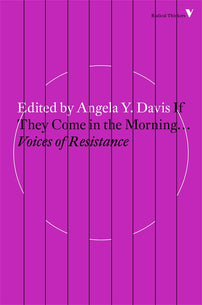Five Book Plan: Making "Order"
David Correia and Tyler Wall select five essential books on the "order" police make.

David Correia and Tyler Wall are the authors of Police: A Field Guide, a radical glossary of the vocabulary of policing that redefines the very way we understand law enforcement, out now from Verso.
Police: A Field Guide is on sale for 40% off until Sunday, April 1 at 11:59pm EST.
Any study of police is also always a study in the making of “order," or perhaps “disorder” might better describe the result of policing. And thus it is extremely difficult to identify five essential books on the order that police make. There are so many relevant and essential books on the topic. Our goal for this 5-book plan is to identify five titles that most influenced our thinking on the topic. For this reason, there are some books that didn’t make our list but require a brief mention. Stuart Hall et al’s Policing the Crisis: Mugging, the State, and Law & Order is a classic that offers key insights into the ways historical “law and order” politics have forged the violent present. Similarly, Keeanga-Yamahtta Taylor’s brilliant From # BlackLivesMatter to Black Liberation is essential reading for anyone interested in understanding our contemporary moment. On the historical evolution of the police power, Markus Dubber’s The Police Power: Patriarchy and the Foundations of American Government is indispensable. Sally Hadden’s Slave patrols: Law and Violence in Virginia and the Carolinas offers a compelling and influential mapping of the slave patrol. Jordan Camp and Christina Heatherton’s Policing the Planet and Bernard Harcourt’s The False Illusion of Broken Windows serve as invaluable resources on broken windows policing. Finally Andrea Ritchie’s new book, Invisible No More: Police Violence Against Black Women and Women of Color, is a timely intervention in studies of police violence that centers the experience of women of color. All of these books are, in our view, required reading on police and policing. The five books we profile below, however, are essential books to anyone interested in understanding, in particular, the (dis)order police make.
1. The Fabrication of Social Order: A Critical Theory of Police Power by Mark Neocleous (Pluto Press, 2000)
Neocleous argues that police power — as a state form and political process with its own unique history and logic — is not merely a sideshow to capital accumulation, but absolutely central to what he calls the “fabrication of social order.” His notion of fabrication is important in that it suggests that police power not only reproduces an already existing order of private property and wage labor, but actively makes or helps bring into being this new order. As he demonstrates, the transition from feudalism to capitalism in Europe is in many ways unthinkable without a ruling class turn to the police power. Neocleous is not merely talking of “the police” (i.e. uniformed cops) often said to begin in 1829 London with Robert Peele, but the broader and older notion of the police power that refers to broad social policy that took as its objects anything to do with “good order.” He maps how this broader conception of police power slowly became narrowed or reduced to merely “law enforcement” or “crime fighting.” This, he suggests, is an ideological trick that obscures the ways that even cop power remains animated not by crime or law, but by the capitalist state’s demand for order. This means that the central police problem is “disorder” or anything deemed a threat to bourgeois order. His last chapter on discretion, political administration and what he calls the “permissive structure of law” is still, in our view, one of the most insightful discussions of police logic.
2. The End of Policing by Alex Vitale (Verso, 2017)
This timely book by Alex Vitale is a measured take-down of the project of policing and its attendant logic of perpetual reform that falsely promises “better” or “more democratic” policing. Vitale provides a pedagogical survey of police history alongside discussions of case studies such as the policing of the homeless, sex workers, gangs, and immigrants. Throughout he argues that the institution of policing is fundamentally geared towards protecting a highly stratified order along the lines of class, race, and gender. One of the greatest strengths of the book is how Vitale demonstrates, via all sorts of empirical evidence, how ineffective police are at accomplishing the things they say they want to accomplish, like reducing crime or making working people safer. But where this book really stands out is when Vitale shows again and again the ways that calls for “police reform”, with the typical solutions said to be “better training," “more education," “diversity," and “more and better technology," usually result in the entrenchment and extension in the reach of police power. All of these “reforms” merely rework the legitimacy of police, and do little to actually challenge the power of police in maintaining capitalist order. Vitale is clearly working within the framework of police abolition, and perhaps the ultimate strength of The End of Policing is to demonstrate the dream of abolition as more than merely utopian “pie in the sky.” To abolish the police institution as we know it becomes a political project that is not only necessary, but empirically supported and totally logical.
3. The First Civil Right: How Liberals Built Prison America by Naomi Murakawa (Oxford University Press, 2014)
Naomi Murakawa’s terrific The First Civil Right makes what she calls a “simple observation.” That the US has never had a crime problem that it racialized, but rather a race problem that it criminalized. Many accounts of the formation of the US carceral state point to conservative “law and order” politicians, often beginning with Richard Nixon, when locating the origins of the expansion of the US criminal justice system — the dramatic rise over the past fifty years in the number of police patrolling US streets, and the even more dramatic rise of people, predominately poor people of color, on parole, probation and in prisons. Murakawa, however, makes the compelling case that liberal ideas of “a right to safety” provided the real momentum for the carceral state — a system that permits limitless violence. It was the liberal law and order agenda, in other words, that legitimized reform — both police reform and criminal justice reform — and which had the effect of collapsing “criminality” and “blackness” in ways that set the stage for the ever expanding reach of police and prisons into the lives of more and more poor people of color. The book focuses on federal funding for law enforcement, sentencing guidelines, mandatory minimums and the death penalty to tell a story of what she calls the “perils of liberal law and order.” Any analysis of the “order” police impose would be incomplete without Murakawa’s analysis. She illustrates the role of liberals in forms of “police professionalization” that serve to extend the police powers rather than constrain it. Liberal law and order have given us police and prisons that are evaluated not on any notion of racial justice, but rather on the administrative capacity and quality by which police, prisons and the criminal justice system more generally searches, arrests, warehouses, and puts people to death. Chapter 3, “Policing the Great Soceity” offers a primer on the develop of US police and policing via what she calls the “high tide of racial liberalism”, in which the “right to safety” became a question of administrative efficiency and “punishment” became “protection.”
4. Disturbing the Peace: Black Culture and the Police Power After Slavery by Bryan Wagner (Harvard University Press, 2010)
The introductory chapter alone is worth the price tag for Bryan Wagner’s excellent book on the relationship between police power, legal terror, and the music of the blues. Inspired by the broader notion of the “police power” that Markus Dubber outlines, Wagner reads the “history of the black vernacular tradition” as a history of the police power’s regulatory violence against black communities in the aftermath of legal slavery. Judges and the courts, Wagner explains, have refused to define the police power, and their reasoning is that police deal with “threats whose character cannot be known in advance.” Wagner takes these “judges and jurists at their word” while thinking through the law’s construction of Blackness as statelessness, or threat, to white order. What Wagner calls the “threat scenario” is central to police logic. This project requires a constant back and forth between legal history and the stories, lyrics, and myths of “the blues” while introducing us to a variety of memorable characters and circumstances where the coercive powers of police come in contact with black cultural production. In other words, Wagner “invokes the police power…as a framework for interpretation.” Wagner’s use of the police power as an interpretive framework is without a doubt what makes Disturbing the Peace so useful. One of us (Tyler) assigned this book in a graduate class, and he remembers one student saying that he would never be able to hear a blues song in the same way. After reading this, it will become clear that the concept of police, like Neocleous has shown so extensively, has serious explanatory power in better understanding power, inequality, and state violence.
5. Dying from Improvement: Inquests and Inquiries into Indigenous Deaths in Custody by Sherene Razack, (University of Toronto Press, 2015)
At the heart of Sherene Razack’s beautifully written and sobering account of Indigenous deaths in custody in Canada rests a disturbing question: “Why is Indigenous death nearly always considered a timely death, a death that no one could prevent of cause?” In six chapters, along with an introduction and conclusion, Razack examines the logic and language, and procedures and processes of official inquiries into Indigenous deaths in custody —inquests that nearly always depict “the Indian on the brink of death.” Settler colonial policing begins, according to Razack, with the idea that Indigenous people hold “a mysterious incapacity to cope with modern life.” This notion helps explain the seemingly contradictory notion represented by her title “Dying from Improvement," in which the settler state imagines the Indigenous body as always already suspended between life and death, and so official inquiries into Indigenous death in custody — whether killed by a cop or by a jailer — are rarely investigations of possible criminal misconduct by cop, and instead are nearly always careful legal performances of Indigenous people as “a dying race.” In our view there is no better study of settler colonial policing than this book. It is a masterful study of the logics and practices that govern the policing of Indigenous people and the structuring role the settler state plays in reinforcing that logic via inquests and inquiries into police killings of Indigenous people. As Razack explains, the official inquest and inquiry is the “making of remnants” in which law explicitly endorses police violence against Indigenous people as an essential part in the making of settler societies, such as Canada. Settler societies require, and thus have a profound investment in, “disappearing Indians.” And police do the work of that disappearing — literally in the case of “Starlight Tours”, which she explains in a chilling chapter on the Saskatoon police service in which officers abandon Indigenous people to freeze to death on the outskirts of town. “Colonial policing,” as she explains “emerges from and maintains a colonial project.”
[book-strip index="1" style="display"]



